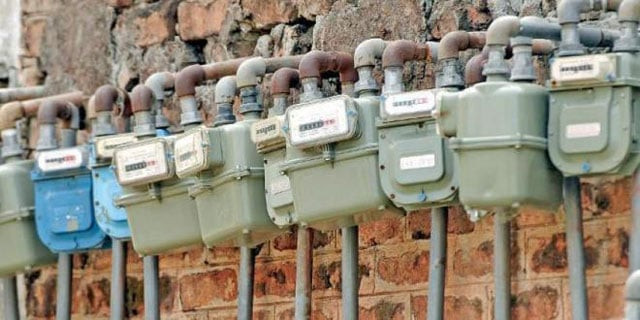Low gas pressure hits Rawalpindi
Citizens resort to using compressors to increase gas pressure

As the temperature continues to drop with the onset of winter, many areas in Rawalpindi have been hit by a drastic reduction in gas supply, resulting in a sharp increase in the usage of illegal compressors.
Several areas including Gulistan Colony, Rehmatabad, Chaklala, Dhok Elahi Bakhsh, Dhok Khaba, Millat Colony, Amarpura, Sadiqabad, Westridge 3, Pirwudhai, Dhok Najo, New Katarian, College Road, Adara and Morgah have been facing extreme low gas pressure, taking a toll on domestic and commercial consumers alike.
Residents of these areas said that the pressure of the gas being supplied from 9 am to 6 pm was very low. In some other localities, the pressure was so low that the residents can only see a tiny flame in their stove.
Locals living on the outskirts of Rawalpindi have resorted to using woods and coals. In many areas, citizens have started installing sucking compressors to suck and increase the gas pressure, causing problems for those who do not resort to using the equipment.
The use of compressors during peak hours worsens the gas pressure and, consequently, consumers who did not use them have to experience low pressure. Shopkeepers have also increased the rates of gas cylinders and sell it at Rs260 per kg.
Read Gas firms win praise for lower loss
A household cylinder that would be filled in Rs1,000 now costs Rs1,550. Meanwhile, the Sui Northern Gas Pipelines Limited (SNGPL) has issued a warning to the citizens against installing and using compressors, declaring them illegal and hazardous.
According to the SNGPL, teams will go door-to-door to ensure that the warning was being complied. It said that citizens using compressors would be fined heavily, their gas connections would be severed and cases would be registered against them.
On the other hand, the sale of compressors and gas sucking pumps had increased disproportionately in the market.
Locally made gas compressors are available between Rs2,700 and Rs4,000 in the market.
The residents said that the SNGPL was meting out discriminatory treatment to them in gas supply. According to them, complaints on the SNGPL helpline go down the drain as officials only offer verbal assurances but never bother to visit areas where the gas supply is low.
A top SNGPL official denying discriminatory gas supply admitted that there was low gas pressure in some tail-end areas.
In Rawalpindi, the gas crisis usually starts in November each year and often stays until January 31.



















COMMENTS
Comments are moderated and generally will be posted if they are on-topic and not abusive.
For more information, please see our Comments FAQ